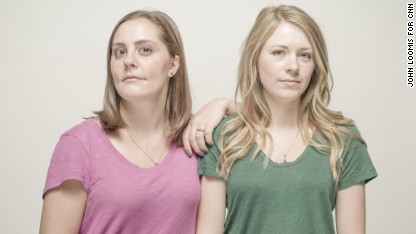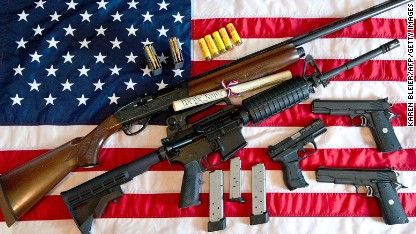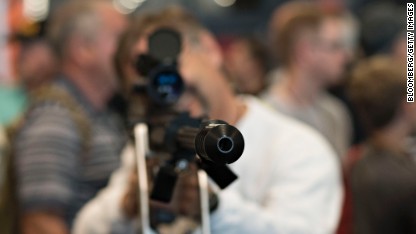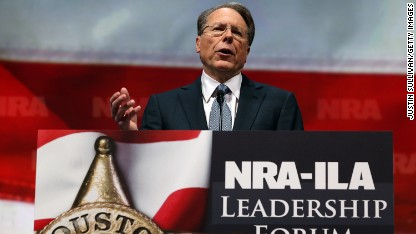Washington (CNN)
They call themselves the club no one wants to join.
They are perhaps the loneliest club; they are also the most determined.
Members hail from Virginia to California, from Indiana to Florida. Their wrists are lined with rubber bracelets that honor lives lost. And the stacks keep growing.
They are Americans bound by grief.
From bullets.
His death has just been devastating. He was the love of my life.
— Anne Haynes, whose husband, Ronald Kirby, was shot and killed in a home invasion
Andy Parker became a member when his daughter, Alison, was killed along with her cameraman, Adam Ward, on live TV. That was just weeks ago.
Dad has made it his mission to take on the gun laws. "She would be ticked at me if I was not here." He pauses, "I know she is right here with me. She'd be going, 'Dad, you go for it.'"
And so, they are.
They've gathered for a rally here in the nation's capital. They are the "other" gun lobby, and they've come to look politicians in the eye, to make them think twice before cashing another check from the NRA.
We need to not just protest police shootings, we need to protest the everyday shootings of our black young men.
— Pamela Bosley, whose son Terrell, 18, was shot and killed outside a Chicago church
They call themselves the "Everytown for Gun Safety Survivor Network." On September 10, they made their voices heard on Capitol Hill. The evening before, they agreed to join CNN's Brooke Baldwin for a town hall at the Newseum.
They brought with them photographs of children whose lives were cut short. Husbands who loved life but died too soon. Moms who will always be missed.
"It's like a family reunion, honestly," says Caren Teves, whose son Alex was shot and killed while protecting his girlfriend during the Aurora movie theater massacre.
"Every time we get together there are new faces, and we want this to stop. Our personal families are shrinking but this family is growing."
I used to think the NRA was a decent group and now I revile them.
— Paul Kemp, a gun owner, whose brother-in-law, Steve Forsyth, died in a mall shooting in Oregon
They found each other on Facebook, met at meetings or reached out anonymously with letters. They thank God for each other. And they share something unspoken, an understanding of the sort that makes them available to one another in the middle of yet another sleepless night.
They have known mass shootings. Suicides. Stray bullets. Home invasions. Accidents.
The bullets come in many forms.
"What's it like going from being happy one day to having your heart ripped out the next? It's a living nightmare. You find the strength to go on. Because you have to. Because you don't have a choice. But it's pain. PAIN."
I had a front-row seat to just indescribable pain and suffering by so many families. That image never leaves.
— Lori Haas, whose daughter Emily was wounded at Virginia Tech
Shelley McMahon searches for the right words. Her grief lingers. It's raw, not even two months old. "Every day, my heart has a hole in it. Every hour. Every minute. Every second."
Her 24-year-old son, Joe, was killed on July 24. One of Joe's friends had invited himself over. They hung out for a bit before walking outside. Then, the friend pulled a gun and shot Joe five times before killing himself.
Mom rushed from inside the home with her two daughters. "We heard the shots. We ran outside. Joe was lying in the street. He was dead. We held his hand. We hugged him. We told him we loved him."
Shelley is accompanied this day by Joe's 19-year-old sister, Maddie, as well as his father, Tom, and his partner, Shannon O'Rourke. They nicknamed Joe "The Gentle Giant" -- a teddy bear beneath his 6-foot-6 frame.
With me being not a statistic but a success story, I tell young people, ‘You don’t have to be what your street says. The world has so much more to offer.’
— Timothy Curtis, who has lost multiple relatives and friends in shootings
"Joe would want me to be strong for him," Mom says. "I want his death to make a difference."
A difference.
That's what you hear from so many. They don't want to take your guns away. About a third of the group owns guns.
They want change. Like making all gun purchases nationwide go through a universal background check.
How about starting there, America?
If we have to outspend the NRA, then that’s what we’ll do.
— Andy Parker, whose daughter Alison was shot and killed on live TV
Jacob and Darchel Mohler keep guns in their home, locked in a safe. They don't want to take away anyone's right to own guns.
But they absolutely believe in their right to ask if your guns are securely stored.
It's a question they never thought to ask when they let their 13-year-old daughter visit a friend's house on June 4, 2013.
Every day, my heart has a hole in it. Every hour. Every minute. Every second.
— Shelley McMahon, whose son Joe, 24, was shot and killed by a friend. Her wristband reads: Not one more.
Brooklynn was the "genuine article," her father says: the child who did her homework, ate fruit and salad, and could never leave a sink of dirty dishes unwashed. She was accidentally shot in the back by her friend with a handgun the friend's father had left unsecured.
"You assume everyone's going to take on the same responsibilities as you as a gun owner and a parent, but we can't make those assumptions," Darchel Mohler says. "I don't anymore."
The couple started the Brooklynn Mae Mohler Foundation to educate gun owners on how to properly store firearms and how to have a conversation with other parents. They see it as a middle of the road approach to gun ownership with an emphasis on safety and responsibility, not limitations.
Grief is omnipresent in the room this evening. So is love, a shared camaraderie forged out of tragedy.
We want to get parents to ask the only question we didn't ask: Do you have unsecured guns in the house? No one for or against guns should have a problem with our message.
— Jacob Mohler, whose daughter Brooklynn, 13, was killed unintentionally with a friend's unsecured gun
It includes a rare gathering of loved ones from the mass shootings that, time and again, bring the national conversation back to guns, but only for awhile: Charleston. Sandy Hook. Aurora. Virginia Tech.
Nine-year-old Christina-Taylor Green went with a neighbor to meet a favorite politician, former Rep. Gabby Gifford, in Tucson, Arizona, on January 8, 2011. The young girl had just been elected to the student council of her elementary school. She held even higher ambitions: to become the first woman president of the United States, after becoming the first woman to ever play Major League Baseball.
Christina-Taylor would've started 8th grade this month. "I'd rather not be here," says her mother, Roxanna Green. "I'd rather not be a member of this club of people who've had their loved ones taken from them. But I've also developed amazing relationships, and some of these people here have become like family to me."
Patricia Maisch was also at the Tucson shooting. She helped disarm the shooter by grabbing his second magazine clip when he stopped to reload.
I usually bring pictures of her body bag and the autopsy, because that’s gun violence. It’s not pretty.
— Nardyne Jefferies, whose daughter Brishell, 16, was killed by AK-47 fire
"It took me witnessing six people dead on the sidewalk to say, 'Guess what, it's time for you to step up," she says. "To honor those six people I had no choice but to carry on."
She was in the Senate chamber when lawmakers defeated a bipartisan proposal to expand background checks on gun sales, shouting "shame on you" with another Everytown member, Lori Haas, leading to their expulsion from the room.
Like Maisch, Haas is among the fortunate ones in this group -- if that's even the appropriate word. Neither has lost a loved one to gun violence. Haas' daughter, Emily, was shot and wounded in the Virginia Tech massacre that left 32 people dead. Emily is now 30 and teaches French -- the subject she was studying that day when bullets flew.
"I had a front-row seat to just indescribable pain and suffering by so many families," Haas says. "That image never leaves."
It took me witnessing six people dead on the sidewalk to say ‘guess what, it’s time for you to step up.’
— Patricia Maisch, who helped disarm the Tucson gunman
She has traveled the nation the past eight years to too many scenes of mass violence, from the Sikh temple shooting in Wisconsin to the movie theater in Aurora. She goes to offer love.
"There's just a sense of relief when you meet somebody who can put their hand on your arm or you can give each other a hug or even just nod at one another -- a sense of understanding that is very, very comforting."
As much as they want to be a salve for each other, they mostly want to jolt the country to attention.
For Nardyne Jefferies that means showing the world an image no one wants to see: her daughter's body laid out in the morgue, her chest cut open from the autopsy, the left side of her head blown away.
It's hard, but I don't mind crying if it lets people know how much it hurts.
— Khary Penebaker, whose mother committed suicide with a gun when he was 20 months old
Brishell was her only child, hit by AK-47 fire shot into a crowd after a funeral. She was 16.
"That's gun violence," she says. "It's not pretty. ... I want people to see what I had to see and what I'll always see."
Pam Bosley became a member of this club when her son Terrell, 18, was gunned down while leaving a Chicago church in 2006.
"We need to not just protest police shootings," she says, "we need to protest the everyday shootings of our black young men."
My son no longer has a voice, and I want to give him one.
— Caren Teves, whose son Alex was shot and killed in the Aurora massacre
Bosley helped start an organization called Purpose Over Pain, after her own anguish nearly did her in. In the first year after Terrell was killed, she tried to take her own life twice.
"I find my strength through God," says Bosley, the daughter of a pastor. "But I was angry at God that first year. Now I know my purpose is helping other mothers. We support each other. We need each other just to survive."
Bosley is nearly a decade into her journey.
People don’t want to talk about mental illness or suicide. They whisper. We have to get past this because people are dying every day.
— Diane Sellgren, whose husband and daughter committed suicide with a gun decades apart
Andy Parker is just weeks in. But he's no less emboldened or determined. This day, he is joined by his daughter's fiancé, Chris Hurst.
Chris and Alison had been dating for nine months. They'd kept their romance secret from colleagues at WDBJ, awaiting the right moment to tell everyone. He was an evening anchor; she was an on-air reporter. "The love of my life," he says.
He has the looks of a young television personality, both boyish and dashing. When a photographer compliments him on his stylish maroon sneakers, he answers proudly: "She picked them out."
Onward, they march.
 The Loneliest Club
The Loneliest Club
















